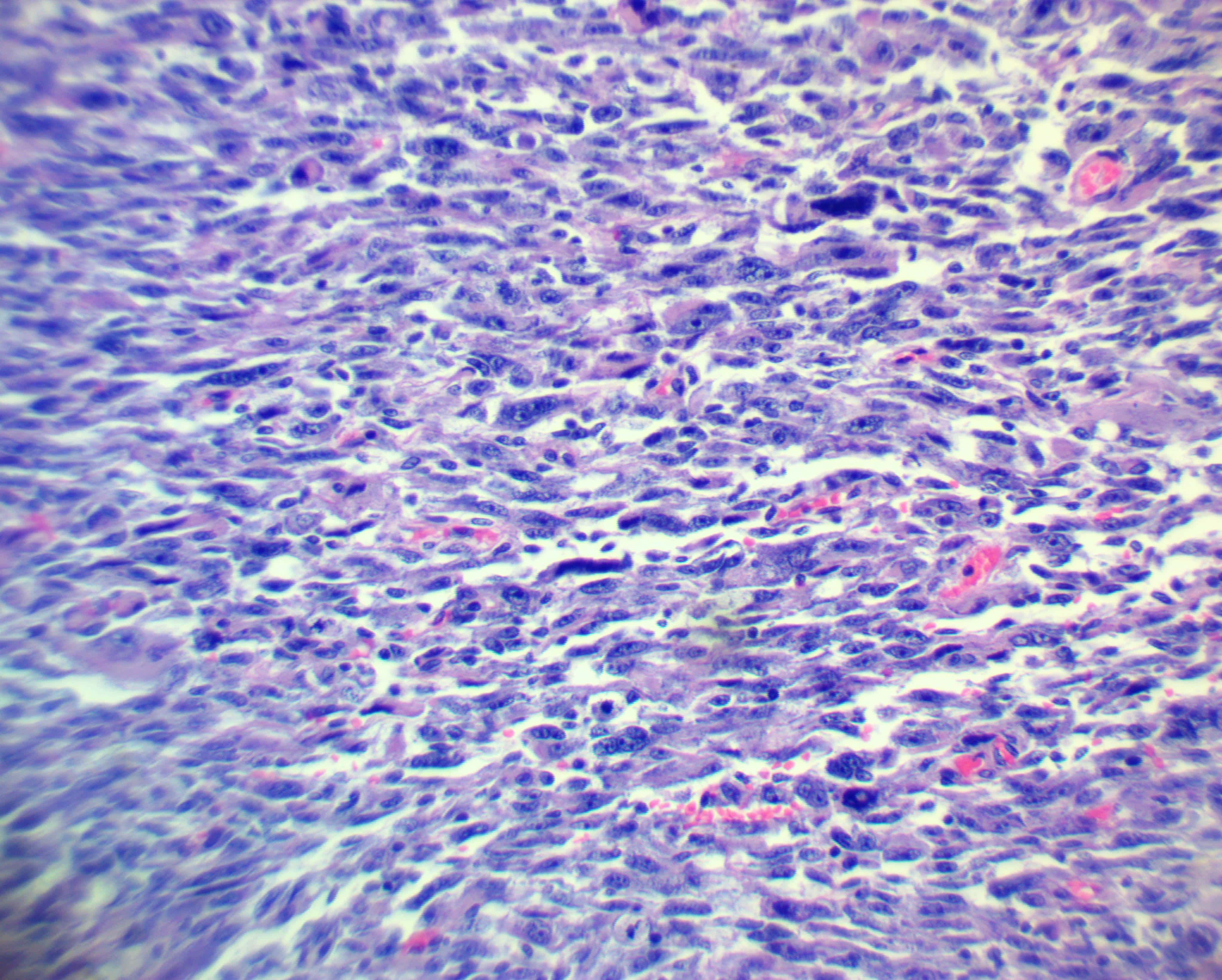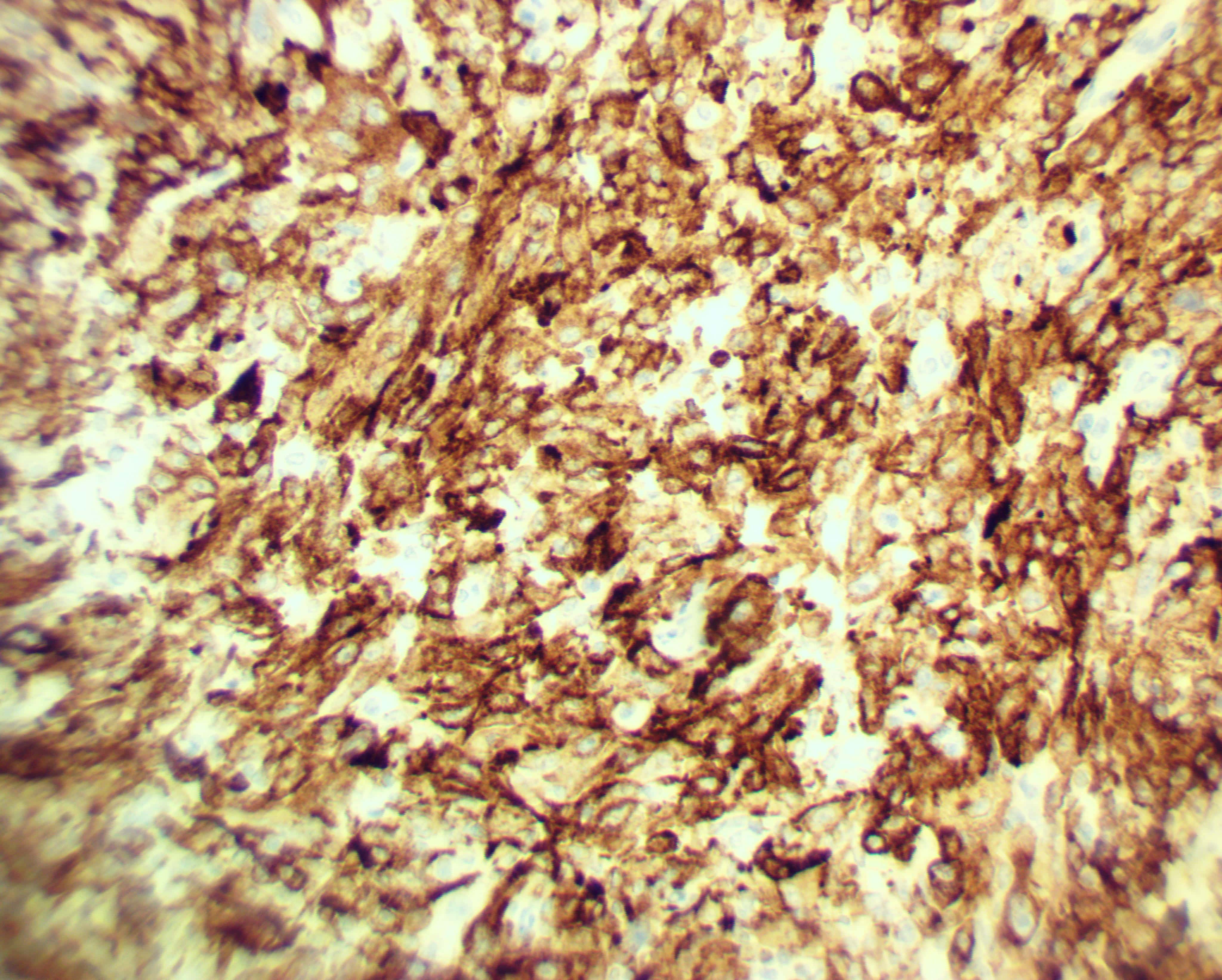Monday Poster Session
Category: Colon
P2542 - A Case of Incidental Malignant PEComa in a Patient with Prostate Cancer
Monday, October 27, 2025
10:30 AM - 4:00 PM PDT
Location: Exhibit Hall
- LT
Liz JOEMON Thaliath, MD
Marshfield Clinic
Marshfield, WI
Presenting Author(s)
Liz JOEMON. Thaliath, MD, Stephanie Carr, DO, Jeffrey Resnick, MD, Joseph Edmund, MD
Marshfield Clinic, Marshfield, WI
Introduction: Perivascular epithelioid cell tumor (PEComa) is a rare mesenchymal neoplasm arising from perivascular epithelioid cells. They demonstrate reactivity to melanocytic and smooth muscle markers. PEComas can occur in the gastrointestinal tract (GI), retroperitoneum, visceral organs, or somatic soft tissues, and are associated with the blood vessel walls. Here, we describe a case of malignant PEComa of the colon, incidentally diagnosed in a patient with prostate cancer.
Case Description/
Methods: 85-year-old male with prostate cancer was evaluated with Pylarify PET scan for rising prostate-specific antigen levels. Incidentally, the scan detected a mass in the ascending colon, with a standardized uptake value maximum of 5.4. Subsequent colonoscopy showed a near-obstructing mass in the hepatic flexure. Biopsy revealed a malignant neoplasm with spindle and epithelioid cell features, favoring GI PEComa. Right hemicolectomy was performed since no other sites of disease were identified. Pathological analysis confirmed a malignant PEComa of the colon. Immunohistochemistry demonstrated strong positivity for Melan-A and HMB-45, while SOX10, S100 cytokeratin cocktail, cytokeratin MNF116, smooth muscle actin, and desmin were negative. The tumor was classified as malignant due to its size, high nuclear grade, high cellularity, presence of atypical mitotic figures, and necrosis. The final tumor stage was pT2bN0, and the resection margins were tumor-free. Considering his age and performance status, close monitoring was recommended without adjuvant therapy.
Discussion: PEComas of GI tract are extremely rare. They are most commonly diagnosed in middle-aged women presenting with pain or symptoms secondary to organ compression. These tumors may result from sporadic mutations or inherited alterations in the TSC1 or TSC2 genes, leading to dysregulation of the mTOR signaling pathway. Nab-sirolimus, an mTOR inhibitor, is the first FDA-approved agent for treating unresectable or metastatic malignant PEComas. In this case, malignant PEComa was identified incidentally, rather than being symptomatically detected. Malignant PEComas are associated with a high risk of metastasis, early detection may improve prognosis. Given the rarity of PEComas, accurate recognition of their histological and immunohistochemical features, combined with clinical context, is critical for optimal management. Close follow-up remains essential for detecting recurrence or metastasis.

Figure: Image: high-grade spindle cell component of the malignant neoplasm (conventional hematoxylin-eosin stain).

Figure:
Image: uniform, strong immunoreactivity of tumor for melan-A.
Disclosures:
Liz Thaliath indicated no relevant financial relationships.
Stephanie Carr indicated no relevant financial relationships.
Jeffrey Resnick indicated no relevant financial relationships.
Joseph Edmund indicated no relevant financial relationships.
Liz JOEMON. Thaliath, MD, Stephanie Carr, DO, Jeffrey Resnick, MD, Joseph Edmund, MD. P2542 - A Case of Incidental Malignant PEComa in a Patient with Prostate Cancer, ACG 2025 Annual Scientific Meeting Abstracts. Phoenix, AZ: American College of Gastroenterology.
Marshfield Clinic, Marshfield, WI
Introduction: Perivascular epithelioid cell tumor (PEComa) is a rare mesenchymal neoplasm arising from perivascular epithelioid cells. They demonstrate reactivity to melanocytic and smooth muscle markers. PEComas can occur in the gastrointestinal tract (GI), retroperitoneum, visceral organs, or somatic soft tissues, and are associated with the blood vessel walls. Here, we describe a case of malignant PEComa of the colon, incidentally diagnosed in a patient with prostate cancer.
Case Description/
Methods: 85-year-old male with prostate cancer was evaluated with Pylarify PET scan for rising prostate-specific antigen levels. Incidentally, the scan detected a mass in the ascending colon, with a standardized uptake value maximum of 5.4. Subsequent colonoscopy showed a near-obstructing mass in the hepatic flexure. Biopsy revealed a malignant neoplasm with spindle and epithelioid cell features, favoring GI PEComa. Right hemicolectomy was performed since no other sites of disease were identified. Pathological analysis confirmed a malignant PEComa of the colon. Immunohistochemistry demonstrated strong positivity for Melan-A and HMB-45, while SOX10, S100 cytokeratin cocktail, cytokeratin MNF116, smooth muscle actin, and desmin were negative. The tumor was classified as malignant due to its size, high nuclear grade, high cellularity, presence of atypical mitotic figures, and necrosis. The final tumor stage was pT2bN0, and the resection margins were tumor-free. Considering his age and performance status, close monitoring was recommended without adjuvant therapy.
Discussion: PEComas of GI tract are extremely rare. They are most commonly diagnosed in middle-aged women presenting with pain or symptoms secondary to organ compression. These tumors may result from sporadic mutations or inherited alterations in the TSC1 or TSC2 genes, leading to dysregulation of the mTOR signaling pathway. Nab-sirolimus, an mTOR inhibitor, is the first FDA-approved agent for treating unresectable or metastatic malignant PEComas. In this case, malignant PEComa was identified incidentally, rather than being symptomatically detected. Malignant PEComas are associated with a high risk of metastasis, early detection may improve prognosis. Given the rarity of PEComas, accurate recognition of their histological and immunohistochemical features, combined with clinical context, is critical for optimal management. Close follow-up remains essential for detecting recurrence or metastasis.

Figure: Image: high-grade spindle cell component of the malignant neoplasm (conventional hematoxylin-eosin stain).

Figure:
Image: uniform, strong immunoreactivity of tumor for melan-A.
Disclosures:
Liz Thaliath indicated no relevant financial relationships.
Stephanie Carr indicated no relevant financial relationships.
Jeffrey Resnick indicated no relevant financial relationships.
Joseph Edmund indicated no relevant financial relationships.
Liz JOEMON. Thaliath, MD, Stephanie Carr, DO, Jeffrey Resnick, MD, Joseph Edmund, MD. P2542 - A Case of Incidental Malignant PEComa in a Patient with Prostate Cancer, ACG 2025 Annual Scientific Meeting Abstracts. Phoenix, AZ: American College of Gastroenterology.
